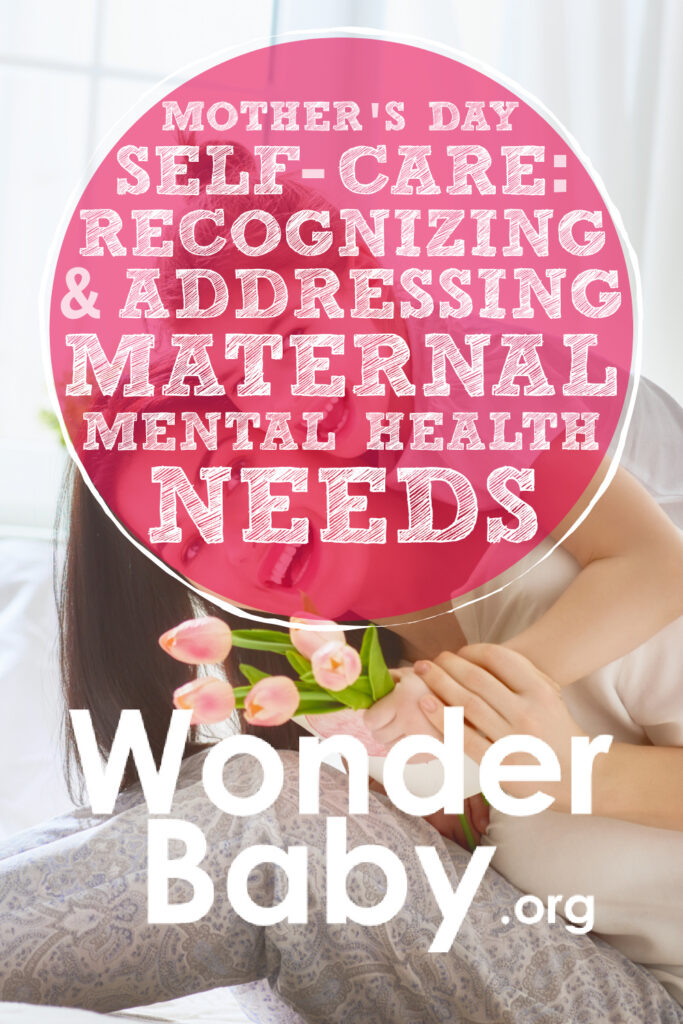Mother’s Day Self-Care: Recognizing and Addressing Maternal Mental Health Needs

- Self-care helps us manage stress and improves our well-being.
- A self-care routine does not have to be time-consuming.
- Practice self-care by setting boundaries, asking for help, and increasing your support.
When was the last time you did something for you? As a parent, you’re probably so busy balancing work and family life that “me time” is one of the last things you’re thinking about.
Caring for yourself is more than bubble baths, a break from the kids, or a nice glass of wine. Sometimes it may be those things—but caring for yourself is more than that. And you deserve to take care of yourself.
Mother’s Day is a great time to start thinking about your needs. But don’t stop there! This Mother’s Day, plan a relaxing day for you and then set an intention to prioritize yourself for the remainder of this year.

As a mom, self-care may feel impossible to practice at times, but simple strategies can help you become more successful at putting yourself at the top of your to-do list.
Mother’s Day: A Time for Renewed Focus on Self-Care

Self-care is focusing on our whole self and our needs. It’s the activities and behaviors we regularly engage in that help us manage stress. And Mother’s Day is the perfect time to reflect and create a plan for your needs.
A 2018 study11. Dugan, A. G., & Barnes-Farrell, J. L.. Working mothers’ second shift, personal resources, and self-care. Community, Work & Family. 2018;23(1), 62–79. https://doi.org/10.1080/13668803.2018.1449732 showed that self-care positively impacts working moms’ well-being. Self-care behaviors are stress-reducing decisions that will enhance our health, prevent disease, limit illness, and restore our health.
Celebrating Motherhood and Self
Regardless of your stage of motherhood, Mother’s Day is a day to celebrate you. This Mother’s Day, start a tradition of making yourself a priority. Put yourself at the top of your to-do list.
Celebrate not only your role as a mother but also you.
Mother’s Day doesn’t need to be overpacked with events and activities. Focus on keeping this day simple. Don’t overcommit and say no to some events to prevent feeling overwhelmed or drained by the end of the day.
Encourage family involvement in your self-care practices today. Ask for help or create a list of simple ideas that the family can help support. Simple self-care ideas might include:
- Sleeping in. Plan for your partner, a friend, or another family member to wake up and care for the children so you can sleep uninterrupted.
- Have a newborn? Arrange for someone to take the overnight shift the night before so you feel even more well-rested!
- Plan a family walk. Keep it short if you have littles!
- Spend time outdoors. Sit and enjoy the sunshine and fresh air or listen to the birds chirping.
After Mother’s Day, don’t stop celebrating and honoring yourself. Instead, let this day be the beginning of your new routine or practice.
Setting the Tone for the Year Ahead

Adopting self-care practices into your regular routines can feel daunting. If you’re unsure how to begin, start by setting intentions for the year ahead.
An intention is an aim or a plan that focuses on your values. Intentions are reminders of who we want to be and how we want to live. Write down what you want from your self-care practice. This will help you clarify what matters most and focus on your next steps.
Intentions might be:
- Patience
- Playfulness
- Mindfulness
- Love yourself
- Be calm
- Be healthier
- Relax more
Once you’ve defined your intention, match actions that will embrace your intention.
If your intention this year is to be more mindful, your actions might include meditating daily, turning tech off during dinner, or being more present when playing with your child.
4 Practical Self-Care Tips for Mothers
To be successful, you’ll need to deliberately plan your self-care routine. Put it on your schedule. For most, scheduling it first thing in the morning, before the day’s chaos, works best. This will prevent you from canceling it or scheduling something else in its place.
Reduce your workload and family demands to prevent yourself from feeling depleted. If you’re experiencing caregiver fatigue, increase your social support and other resources. Choose activities that enhance your mind and body functioning to improve your mental and physical energy.
Select activities off of this self-care wheel22. Self-Care Wheel. Olga Phoenix. https://olgaphoenix.com/self-care-wheel, created by Olga Phoenix, from each of the six dimensions that align with your intention.
Here are some other tips for building a sustainable self-care routine:
1. Time Management

Time is a finite resource. We can’t add more time in a day. Many moms share that the biggest struggle to incorporating self-care is not having enough time in the day.
You’re probably juggling many roles and feel overwhelmed with your busy schedule. Of course, it’s hard to find time. Creating a self-care routine doesn’t mean creating time for your self-care but reorganizing your schedule to include it.
When scheduling your day, think about the following:
- Remember the intention you’ve set. Do your day’s activities match your intention?
- Prioritizing tasks. Sometimes we can’t do everything in a day. Prioritize the most important things and keep self-care at the top of your list.
- Delegate or ask for help with tasks. If your family is able, think about some of the tasks you could pay others to do, like cleaning the house, mowing the lawn, or helping the kids for short periods.
- Schedule just a few minutes for self-care to start. It doesn’t have to be time-consuming.
- Set realistic goals and boundaries. Practice saying no. Remember, when you say yes to someone else, you’re saying no to your time.
2. Emotional Self-Care

How you talk to yourself matters. Learn to forgive and love yourself as part of your emotional self-care practice. You are a good mom. If you’re feeling guilty or struggling to love yourself, incorporate certain activities in your self-care routine to improve your mental state.
Emotional self-care activities can include mindfulness and meditation practices.
Mindfulness is being present at the moment, while meditation is a practice that enhances your mindfulness skills. If you’re new to meditation, look for short guided meditations to start practicing, such as a loving-kindness meditation. Set aside a few minutes in a calm, comfortable, and quiet place.
If you’re struggling to find time alone for mindfulness, include your kids in your mindfulness practices too. There are fun mindfulness activities for kids that can help your whole family.
Other emotional self-care activities include:
- Positive affirmations
- Cuddling a pet
- Finding a hobby you love
- Journaling and creative outlets
3. Physical Self-Care

Physical self-care doesn’t just mean exercise. Moving your body, adequate sleep, and nutrition are all important for physical health.
Research shows33. Scott, A. J., Webb, T. L., Martyn-St James, M., Rowse, G., & Weich, S.. Improving sleep quality leads to better mental health: A meta-analysis of randomised controlled trials. Sleep Medicine Reviews. 2021;60, 101556. https://doi.org/10.1016/j.smrv.2021.101556 that better sleep improves mental health. Rest is important. When parenting a newborn, it can feel impossible to get a good night’s rest, but ask for help during the night and take naps during the day when possible.
Nutrition is also important for your health. Moms focus on ensuring their children eat a balanced and nutritious diet and sometimes neglect themselves. Nourish yourself with healthy foods, and create a daily routine of eating when your child eats.
Spend time throughout the day moving your body. You don’t have to go to the gym to get exercise. Take a quick walk outside and soak up the sunshine (and some vitamin D!). Take a yoga class or find a yoga video to do at home. Take the time in the morning to stretch when first getting out of bed.
4. Social Self-Care

The transition to motherhood can sometimes feel isolating. At times, stay-at-home moms and working moms alike can feel disconnected from others. Self-care for busy moms includes finding ways to feel connected to the outside world.
Schedule time for friends and personal interests. Find other moms who share similar interests or hobbies. Look into a local parenting group or join a book club and dive into a good book.
Top 3 Barriers to Maternal Self-Care
It’s so easy to fall into the habit of neglecting your self-care as a mom, or to simply feel that taking care of yourself is impossible. It can help to consider what’s stopping you so that you can find a way to overcome that barrier.
1. Mom Guilt and Shame

As a mom, you may feel guilty for asking someone else to watch your kids while you do something fun. Guilt often forms when you feel you’re not doing enough as a parent. Many moms experience guilt, and eventually, that mom guilt evolves into shame.
If you find yourself thinking “I’m a bad mom,” instead of “I didn’t handle that well,” you are experiencing shame. In a 2021 study44. Law, N. K., Hall, P. L., & Cheshire, A.. Common Negative Thoughts in Early Motherhood and Their Relationship to Guilt, Shame and Depression. Journal of Child and Family Studies. 2021;30(8), 1831–1845. https://doi.org/10.1007/s10826-021-01968-6 regarding common negative thoughts in motherhood, 63% of participants in the study reported thinking “I am a bad mom.”
Negative thoughts, guilt, or shame increase stress and feelings of postpartum depression or mom burnout. If you’re experiencing guilt or shame, try:
- Recognizing irrational thoughts.
- Helping yourself first.
- Sharing responsibilities with others.
- Talking with your partner or trusted friend.
2. Lack of Support

If your guilt continues or if you’re concerned about postpartum depression, seek support from a mental health professional. Therapy is a great way to start taking care of yourself. A therapist can help you set boundaries and help your overall well-being.
Seek support from other mothers in your community or online.
Talk with your partner about your feelings and focus on nurturing your relationship. Schedule a regular date night and include your spouse in your self-care journey.
3. Balancing Work and Family Life

Sometimes, it feels like society expects moms to do it all. Societal expectations are unrealistic.
You aren’t supposed to do it all. Give yourself a break. Ask your friends, parents, and other support for help.
Avoid social media accounts that present parenthood in unrealistic stereotypes, and try to avoid comparing yourself to others on social media.
Instead of finding balance in your work and family life, focus on setting boundaries in each area. Schedule time in your day for work, family, and me time. Honor the boundaries you set. It will feel good for you and your kids.
References
- Dugan, A. G., & Barnes-Farrell, J. L. (2018). Working mothers’ second shift, personal resources, and self-care. Community, Work & Family, 23(1), 62–79. https://doi.org/10.1080/13668803.2018.1449732
- Self-Care Wheel. Olga Phoenix. (n.d.). https://olgaphoenix.com/self-care-wheel
- Scott, A. J., Webb, T. L., Martyn-St James, M., Rowse, G., & Weich, S. (2021). Improving sleep quality leads to better mental health: A meta-analysis of randomised controlled trials. Sleep Medicine Reviews, 60, 101556. https://doi.org/10.1016/j.smrv.2021.101556
- Law, N. K., Hall, P. L., & Cheshire, A. (2021). Common Negative Thoughts in Early Motherhood and Their Relationship to Guilt, Shame and Depression. Journal of Child and Family Studies, 30(8), 1831–1845. https://doi.org/10.1007/s10826-021-01968-6

Related Posts

Eye Conditions and Syndromes, Visual Impairment
Neuralink Announces Plans to Restore Sight to the Blind with Brain Chip
Elon Musk’s company Neuralink has announced plans to begin human trials of its new “Blindsight” brain chip by the end of 2025.

Special Needs
5 Spring Cleaning Tips for Families of Children with Disabilities
Spring cleaning is an opportunity to create a more accessible, organized, and supportive space for your child with disabilities. Declutter, deep clean, and refresh!

Visual Impairment
The Gift of Understanding: How a Young Child Helps His Blind Father Navigate Life
When a parent is blind, it’s natural for people to wonder how their sighted child will adapt. Will they struggle to understand their parent’s needs? Will they feel burdened by...